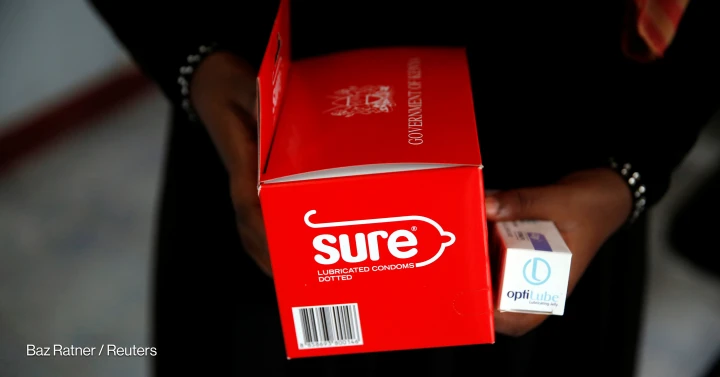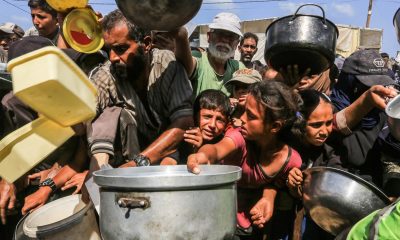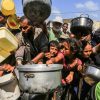World News
The fight to get HIV services back on track post-USAID cuts in Malawi
Malawi was at the forefront of HIV prevention efforts before Washington cut global aid. Now officials are struggling to revive traditional prevention services and introduce new innovations.
For years, Malawi has been at the forefront of HIV prevention efforts in sub-Saharan Africa, including spearheading the introduction of a new long-acting injectable method last year. That coincided with a drop in new HIV infections from an estimated 19,000 in 2020 to an estimated 11,800 in 2024.
But this progress is under threat after the Trump administration eliminated U.S. support for most HIV-prevention services globally. That hit hard in Malawi, where donors fund around 85% of the country’s HIV response. The money comes primarily from the U.S. President’s Emergency Plan for AIDS Relief, or PEPFAR, and the Global Fund to Fight AIDS, Tuberculosis and Malaria, to which the U.S. has been the largest donor.
Officials are now struggling to preserve both traditional methods, such as condom distribution, without squandering the new — and still expensive — innovations in long-acting injectable preexposure prophylaxis, or PrEP.
The funding cuts “disrupted our trajectory toward ending AIDS,” Simon Sikwese told Devex. Sikwese runs Pakachere, which provides HIV services for female sex workers in Malawi. “We need to move in quickly and look at how else can we mobilize resources to make sure we intensify prevention, to make sure we give people more choices for HIV prevention.”
That is exactly what Malawi was trying to do.
In place of long-standing strategies, such as encouraging people to be faithful to their sexual partners or wear condoms, the country rolled out a daily oral version of PrEP in 2021. Oral PrEP prevents HIV transmission if taken correctly. The service is now available in nearly 300 facilities across the country, according to government officials. By July of this year, people had started an oral PrEP regimen nearly 183,000 times.
Last year, officials added long-acting injectable cabotegravir, or CAB-LA, a form of PrEP that only needs to be administered every other month. The drug was introduced through an implementation study, and around 1,700 clients have received the injections, Malawian officials announced at the International AIDS Society, or IAS, meeting in July.
The demand for CAB-LA has Malawi pressing to introduce the longer-lasting injectable, lenacapavir, which only needs to be administered every six months. However, Matanje was told the country will need to pay lenacapavir’s manufacturer, Gilead Sciences, $14,000 per dose, which is the list price for the drug in the United States. Gilead did not respond to a request to confirm the price as of the time of publication. That is well above the estimated yearly price of $170 to $240 a year for CAB-LA.
Either injectable will stretch the country’s suddenly circumscribed budget for HIV prevention. The country’s prevention efforts had hinged on U.S. support — through PEPFAR, Washington had pumped $1.8 billion into Malawi’s HIV response by 2023.
The degree of dependency became clear when the Trump administration froze U.S. aid in late January to conduct a 90-day spending review. Prevention services in Malawi came to a virtual standstill.
In the immediate aftermath of the funding cuts, Malawi’s government prioritized treatment for people living with HIV. The Ministry of Health issued instructions for health facilities to maintain treatment services, even as they suspended oral and injectable PrEP.
“We need to keep those people alive,” Dr. Samson Mndolo, Malawi’s secretary of health, told reporters. “If we are not able to sustain those, I think then we’ll open a can of worms.”
Dr. Beatrice Matanje, the CEO of the National AIDS Commission, said that decision was also driven by a sudden shortage in HIV testing services, which is a prerequisite to starting PrEP.
Washington soon allowed some HIV programs to continue under lifesaving waivers, including efforts to stop mothers from transmitting the disease to their newborns. Most U.S. funding for prevention remained suspended or was eventually rescinded, though.
By the end of February, Malawi allowed some PrEP services to resume. And by June, facilities were encouraged to start enrolling new clients, according to Malawian health officials speaking at the 2025 conference of the International AIDS Society. But most programs were still not functioning anywhere near their previous capacity by this month, and crucial components have disappeared with the funding cuts.
Across Malawi, drop-in centers, or DICs, for marginalized communities have been shuttered. These facilities depended on U.S. funding to provide prevention services to communities — including men who have sex with men, transgender women, and female sex workers — most at risk of acquiring HIV in Malawi.
Because they face potential harassment at government facilities, members of these communities said that if the DICs were closed or their services sharply reduced, they would rather just go without prevention. The repercussions are starting to become clear.
Salome Katha Mbewe runs one of Pakachere’s remaining drop-in centers in a busy neighborhood in the capital, Lilongwe.
Her staff used to coordinate 12 community outreach efforts each month, offering HIV testing and distributing condoms and PrEP. Now all services are contained within the center. That means they are seeing far fewer clients than they used to. Yet, the number of sexually transmitted infections they are treating each month has risen from roughly 25 to 50, she said — a signal that their clients were not accessing condoms or other prevention services.
Mbewe worries a wave of new HIV infections will follow, even for clients who ultimately sought support from government facilities, she told Devex. “They feel like they are being ignored most of the time. And most of them, they are not attended the way we attended to them.”
The services at those government-run centers are also no longer operating at full capacity. One of the biggest blows to prevention efforts has been Washington’s elimination of support for many outreach services. Outreach workers were the bridge between the health centers and surrounding communities, recruiting people to start PrEP and delivering pills and condoms to clients who lived far from the facilities.
The absence of these workers is being felt acutely at the moment. In the wake of the shutdown, communities are neglecting prevention services because they assume they have been completely eliminated, according to Lorraine Mkandawire, who runs a clinic in Blantyre run by the Malawi AIDS Counselling and Resource Organization. Outreach workers would have taken the lead on alerting clients that services had resumed.
At clinics, hospitals, and DICs across five districts Devex visited, health workers confirmed that following the pause in services and the funding cuts, there has been a decline in the use of prevention services. Clients aren’t picking up condoms and lubricants as frequently and, in some locations, oral PrEP use has fallen off precipitously.
“With this, with our activities being reduced, our worry is that we may have a rise of new infections in our communities,” said Paul Manyamba, the head of the National Association for People Living with HIV/AIDS in Malawi.
Despite the challenges, some PrEP services have proven to be resilient.
Joseph Chimtengo started CAB-LA more than a year ago. Chimtengo, who is gay, asked to use a pseudonym to protect his identity because homosexual activity is illegal in Malawi.
He receives injections at a DIC tailored to sexual minorities run by the Centre for the Development of the People on the outskirts of Blantyre, in southern Malawi.
Despite the necessary travel every other month for an injection, “I found it quite relieving to be having the injectables, since the oral PrEP was just too much,” he told Devex. There was the risk that his mother might discover the pills and ask why he needed them or that he would forget to take them. When CAB-LA services resumed, he had no reservations about continuing his regular visits to the drop-in center.
Though anecdotal, that kind of commitment to injectable PrEP has officials keen to expand access just at the moment funding is evaporating. There is still money available from the Global Fund, though, which will be used to increase the facilities offering CAB-LA, according to the National AIDS Commission’s Matanje.
Malawian officials are also asking the Global Fund if they can reallocate some of that CAB-LA funding to introduce the twice-yearly injectable lenacapavir.
“It doesn’t make sense for Malawi to be one of the early adopters of long-acting injectables, but to be left behind on the better option,” Matanje said.
At Gilead’s price of $28,000 for an annual supply of lenacapavir per user, the reallocated funding would only allow them to purchase enough doses for 200 clients each year, she said. But she described it as preparatory.
“Even if it sounds ridiculous, it’s because we are hoping that with all the lobbying and with the generics coming in, maybe in a couple of years, prices will go down,” she said. “And when they go down, this money can buy more.”
At the same time, officials are trying to figure out how to revive other prevention services, including oral PrEP and condom distribution.
The government has allocated $11 million to the health ministry to start addressing some of the gaps created by the U.S. funding cuts. That includes a drive to recruit nearly 5,000 new health workers, according to Mndolo, the health secretary. Among them, he said there will be community health workers responsible for shoring up HIV outreach work.
Matanje said specific funding could also be set aside to support civil society groups to ensure services for marginalized communities continue.
She acknowledged, though, that it will be a challenge to make up the entire funding shortfall created by the U.S. cuts.
“We are calling for innovative ways of promoting prevention, even with little money, as little money as possible,” she said. That includes thinking about charging clients who can afford it for commodities, such as condoms. It also means strategizing over how to make people less reliant on outreach workers to prod them to access HIV services.
“The willingness is there,” Matanje said. “The willingness to get back to where it was is there.”
Source;BBC
Comments


























